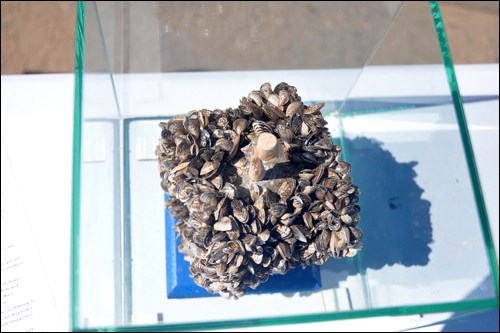Efforts are being stepped up to keep a dangerous aquatic invasive species out of Saskatchewan.
The threat is from Quagga mussels and Zebra mussels, species from eastern Europe that are non-native to North America and which can wreak havoc on the ecosystem if they enter the province.
Friday, a display was set up outside Territorial Place Mall, a familiar spot for boaters on their way to the nearby lakes, to raise awareness of the issue.
Environment Minister Scott Moe and Battlefords MLA Herb Cox were there to explain new regulations that came in effect, as well as to spread the message about aquatic invasive species and how to prevent it.
May 10-16 has been declared Aquatic Invasive Species Awareness Week.
On hand was a watercraft decontamination unit that is designed to clean and dry boats to protect them from mussels.
The mussels have been a growing concern in North America for a number of years. They were found in the Great Lakes region in the late 1980s and have since spread across North America including the southwestern United States and even into Manitoba.
The mussels themselves have the ability to multiply rapidly. A female can lay 40,000 eggs in a reproductive cycle, or up to one million eggs a year.
Cox also noted the mussels are able to adapt and reproduce at very low temperatures and can be found as deep as 540 feet in a lake.
Worse, getting rid of the mussels is difficult.
“They have no known predators, and we have no known way of manmade methods to get rid of them,” noted Cox.
The only defence, the officials said, is to keep them out.
So far, they have stayed out of the Pacific Northwest region that includes Saskatchewan.
Officials want the situation to stay that way. Not only are the mussels damaging to the ecosystem, but they clog up drains and pipes, which means high costs of cleanup.
That was clearly a concern for the two local mayors, Ian Hamilton of North Battleford and Derek Mahon of Battleford, who were at the demonstration.
Cox said in speaking to officials in Idaho and Washington they are estimating the cost is anywhere between $3 to $5 billion.
The impact would be on recreation properties, irrigation and commercial fishing “because they do wipe out the fish in some lakes,” said Cox. It also impacts the water supplies for municipalities, potash mines and other users.
Moe called the lakes and waterways of Saskatchewan “really a pristine asset that we have,” citing its uses for recreation or for industrial or municipal uses.
“There are a whole number, a host of reasons, why we want to keep an aquatic invasive species such as zebra and quagga mussels out of our waterways. It would be disastrous on an economic front as well as a recreational front.”
As for the direct impact on the ecosystem itself, Cox noted to reporters the mussels are “filter feeders. They basically take everything out of the water, including the zooplankton, the phytoplankton and, of course, that is the beginning of the food chain. So when you affect the very beginning of that food chain it's going to carry on up.”
The importance of making boat owners aware of the issue stems from the fact that quagga or zebra mussels most often spread when watercraft go from one water source to another.
Officials have increased efforts to educate boat owners about the issue, so people will look at their watercraft before they move it from one body of water to another. The message to boat owners is to clean, drain and dry their boat when leaving a lake or river.
Environmental regulations have been stepped up to allow conservation officers to have the ability to pull a boat over and do an inspection on it.
As well officials will continue to step up their educational efforts and have partnered with the Pacific Northwest Economic Region as well as with the New West Partnership.
Moe adds that an investment has been made in two decontamination units.
The unit uses hot water to remove the mussels from watercraft, and is mobile so it can be transported anywhere in the province.
No chemicals are used in the decontamination, according to fisheries biologist Chad Doherty. In fact, chemicals aren’t effective.
Doherty said there is research showing the mussels can detect chemicals and protect themselves by closing tightly together.
But Doherty said the heat from hot water can cut through the mussels’ shells and can be effective in actually killing the organism.
The decontamination units will patrol around the southern and eastern borders in particular.
But they will be taken to various lakes and to various fishing events including fishing derbies, in order to help spread the message and also be able to clean up any infected boats that might have come in from outside the province immediately.



